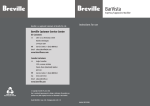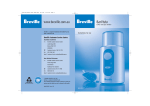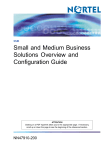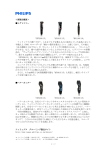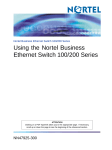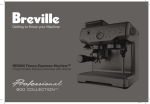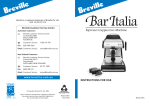Download Breville Customer Service Centre
Transcript
BarVista www.breville.com.au Breville is a registered trademark of Breville Pty. Ltd. ABN 98 000 092 928 Espresso/Cappuccino Machine Instructions for use Breville Customer Service Centre Australian Customers ✉ Breville Customer Service Centre Locked Bag 2000 Botany NSW 2019 AUSTRALIA ☎ Customer Service: 1300 139 798 Fax (02) 9384 9601 Email Customer Service: [email protected] New Zealand Customers ✉ Breville Customer Service Centre Private Bag 94411 Greenmount Auckland, New Zealand ☎ Customer Service: 09 271 3980 Fax 0800 288 513 Email Customer Service: [email protected] © Copyright. Breville Pty. Ltd. 2004 BarVista is a trademark of Breville Pty Ltd. Due to continual improvements in design or otherwise, the product you purchase may differ slightly from the one illustrated in this booklet. Model BES200 Issue 1/05 Model BES200 Contents Page 2 Breville recommends safety first 4 Know your Breville Espresso/Cappuccino Machine 6 Operating your Breville Espresso/Cappuccino Machine 7 Coffee making tips 11 Care and cleaning 12 Troubleshooting chart 14 Coffees to try 15 Congratulations on the purchase of your new Breville BarVista Espresso/Cappuccino Machine. Breville recommends safety first We at Breville are very safety conscious. We design and manufacture consumer products with the safety of you, our valued customer, foremost in mind. In addition, we ask that you exercise a degree of care when using any electrical appliance and adhere to the following precautions: IMPORTANT SAFEGUARDS FOR ALL ELECTRICAL APPLIANCES IMPORTANT SAFEGUARDS FOR YOUR BREVILLE BARVISTA ESPRESSO/CAPPUCCINO MACHINE. • To protect against electric shock, do not immerse cord, plug or appliance in water or any other liquid. • Carefully read all instructions before operating and save for future reference. • Remove any promotional stickers or tags before using the BarVista Espresso/Cappuccino Machine for the first time. • Do not place the BarVista Espresso/Cappuccino Machine near the edge of a bench of table during operation. Ensure the surface is level, clean and free of water, etc. • Do not place the BarVista Espresso/Cappuccino Machine on or near a hot gas or electric burner, or where it could touch a heated oven. • Do not use on metal surfaces, for example a sink drain board. • Always ensure the BarVista Espresso/Cappuccino Machine is properly assembled before connecting to the power outlet and operating. • Do not touch hot surfaces. Allow the BarVista Espresso/Cappuccino Machine to cool down before moving or cleaning any parts. • Do not place anything, other than cups for warming, on top of the BarVista Espresso/Cappuccino Machine. • Always switch the BarVista Espresso/Cappuccino Machine to ‘OFF’, switch the power off at the power outlet and then remove the plug when the appliance is to be left unattended, if not in use, before cleaning, before attempting to move the appliance, disassembling, assembling and when storing the appliance. • Unwind the cord before use. • Do not let the cord hang over the edge of a table or counter, touch hot surfaces or become knotted. • This appliance is not intended for use by young children or infirm persons unless they have been adequately supervised by a responsible person to ensure they can use the appliance safely. • Young children should be supervised to ensure they do not play with the appliance. • It is recommended to inspect the appliance regularly. Do not use if power supply cord, plug or appliance becomes damaged in any way. Return the entire appliance to the nearest authorised Breville Service Centre for examination and/or repair. • Any maintenance other than cleaning should be performed at an authorised Breville Service Centre. • The installation of a residual current device (safety switch) is recommended to provide additional safety protection when using electrical appliances. It is advisable that a safety switch with a rated residual operating current not exceeding 30mA be installed in the electrical circuit supplying the appliance. See your electrician for professional advice. • This appliance is for household use only. Do not use this appliance for anything other than its intended use. Do not use in moving vehicles or boats. Do not use outdoors. • Keep the appliance and accessories clean. Follow the cleaning instructions provided in this book. • Never plug in or switch on the BarVista Espresso/Cappuccino Machine without water in the water tank. • Only use cold water in the water tank. Do not use any other liquid. • Ensure the filter holder is firmly inserted and secured into the brewing head before using the BarVista Espresso/Cappuccino Machine. • Never remove the filter holder during the brewing operation as the machine is under pressure. • Do not leave the BarVista Espresso/Cappuccino Machine unattended when in use. 4 5 Know your Breville Espresso/Cappuccino Machine Italian designed & made 15 bar pump system Thermoblock heating system Cup warming plate Operating your Breville Espresso/Cappuccino Machine Before Using Your Espresso Machine Preparing the Coffee Wash the filter holder and the stainless filters in mild detergent and water. Rinse thoroughly. • Place the 1 or 2 cup filter into the filter holder and fill with ground espresso coffee (use the smaller filter for 1 cup and the larger filter for 2 cups). It is recommended to complete a brewing operation with cold water but without ground coffee before making your first coffee to ensure that all internal piping has been preheated (see ‘Brewing Coffee’ page 8). Removable 1.7 litre water tank Filling the water tank Pre-brew function Auto purge system • Ensure the Power ‘on/off’ switch is set to the ‘OFF’ position and Selector Control is in the ‘STAND BY’ position. • Use the measuring/tamping spoon provided to measure 1 level measure of espresso coffee for the 1 cup filter and 2 level measures for the 2 cup filter. It is important to use the correct amount of ground coffee for each filter as the filter perforations have been constructed to utilise the pressure build up in the machine to extract optimal flavour with each brewing. • Switch off at the power outlet and unplug the power cord. External water level indicator 1 and 2 cup filters Froth enhancer - for easier frothing and steaming of milk • Lift up the water tank lid and remove the water tank. Fill with cold water to the maximum mark and replace back into position in the machine, pressing down firmly so that the water valve opens. Close the water tank lid. Advanced crema system The water tank should be filled with fresh cold water before use. Check water level before use and replace the water daily. Do not use mineral or distilled water. Note Water level indicator - prevents overflow from drip tray Removable drip tray - catches any coffee spills for easier cleaning 6 • Distribute the coffee evenly and press down lightly with the tamping end of the measuring spoon (if there is too much coffee, the flow of water can become blocked). Stainless steel frothing jug and measuring/tamping spoon included (not shown) 7 Operating your Breville Espresso/Cappuccino Machine continued • Clean any excess coffee from the rim of the filter holder to ensure a proper fit under the brew head. • Place the filter holder underneath the brew head so that the handle is positioned to the left of centre. Lift the filter holder until it contacts the brew head and rotate to the right, as per graphics on the filter holder outlet. Pre-warming cups For optimal coffee temperature, pre-warm the espresso cups by placing them on the cup warming plate. Brewing coffee • Ensure the selector control is in the ‘STAND BY’ position. • Plug the power cord into a 230/240V electrical outlet and switch on. • Press the power ‘on/off’ button to the ‘ON’ position. • The orange ‘heating’ light turns off when the machine has reached the correct temperature. • Ensure the drip tray is in place. • Place one or two pre-heated cups beneath the filter holder outlet. • Turn the selector control to the ‘Espresso’/cup position. • After a few seconds*, aromatic coffee will begin to brew into the cups. A pumping noise will be heard in this operation. *Pre-brew function How to froth milk for a cappuccino or latte When the Selector Control is set to the ‘Espresso’/cup position, the 15 bar pump pumps water momentarily, followed by a pause, then continues to pump the water through to the ground coffee in the Filter Holder. This pre-brew function is an advanced feature of the BarVista Espresso/Cappuccino Machine. The ground coffee is moistened by a small amount of water before full extraction. The ground coffee expands and when greater pressure is built up, the brewed coffee is extracted with its full flavour. The Breville BarVista comes complete with a Froth Enhancer for easier frothing of milk. When less froth is required, remove the Froth Enhancer and steam the milk using the Steam Wand. To remove the Froth Enhancer, ensure it is cool then simply pull down and remove. • Fill the stainless steel frothing jug 1⁄3 full with cold milk. • Gently move the frothing jug in a circular motion around the froth enhancer. • When sufficient coffee has flowed into the cups, turn the selector control to the ‘STAND BY’ position. This will stop the flow of coffee. • Turn the Selector Control to the ‘Steam’ position. The orange ‘heating’ light will start to flash indicating that the Thermoblock Heating System is heating and preparing to create steam. • When the milk has begun to increase in volume, immerse the froth enhancer deeper into the milk to further heat the milk. • If the steam function is not required, press the power ‘on/off’ button to the ‘OFF’ position, switch off at the power outlet, unplug the power cord and allow the machine to cool. • Remove the filter holder from the brew head, turn the filter holder upside down to empty the used coffee (used coffee grounds should be thrown away with domestic waste and not down the sink which may block drains). Remove the filter and rinse the filter and filter holder with water and allow to dry. The machine remains ready for brewing and maintains a constant heating temperature whilst the Power ‘on/off’ button remains in the ‘On’ position. If the temperature lowers, the orange ‘heating’ light will illuminate and the coffee machine will automatically reheat to the correct brewing temperature. Note The first step in making a cappuccino/latte is to make a short espresso (Follow steps on ‘Brewing Coffee’). Then: If steam starts coming from the Steam Wand before it is immersed in the milk, pause the steam by turning the Selector Control back to the ‘STAND BY’ position. This will avoid the steam pressure blowing milk out of the jug. A pumping noise will sound for a short time. Note • Place your hand on the bottom of the stainless frothing jug. When the BarVista Espresso/Cappuccino Machine is creating steam a pulsing noise can be heard. This is the normal operation of the 15 bar pump. • When the jug becomes too hot to touch, turn the selector control to the ‘STAND BY’ position to stop the steaming function before removing the jug. Note • Pour the steamed milk to each cup of freshly brewed espresso coffee and spoon on the frothed milk in the following ratio’s: • As soon as the orange ‘heating’ light has switched off, quickly insert the steam wand into jug the of milk so that the froth enhancer is immersed 10mm into the milk. Cappuccino - 1⁄3 espresso, 1⁄3 steamed milk, 1⁄3 frothed milk. Latte - 1⁄3 espresso topped with steamed milk and about 10cm of frothed milk, (traditionally served in a glass). Always ensure that the Froth Enhancer has been firmly pushed onto the steam wand. For best results use fresh cold milk (lite milk will froth easier). Always clean the steam wand and froth enhancer after every use (refer to care and cleaning). Note THE METAL PARTS OF THE FILTER HOLDER MIGHT STILL BE VERY HOT. COOL THESE PARTS IN COLD WATER. 8 9 Operating your Breville Espresso/Cappuccino Machine continued Auto Purge System For brewing more coffee immediately after using the steam function, the BarVista Espresso/Cappuccino Machine features an auto-purge system. This ensures that the ground coffee will not be burnt by the initial water flow from the Thermoblock that could be too hot. Instead this water is automatically released internally into the Drip Tray ensuring that the internal thermostat is at optimal temperature for extracting coffee. Your coffee will always be extracted at this optimal temperature ensuring only the best flavoured coffee is achieved. Coffee making tips Making a good cup of coffee is an art that is simple to achieve. Here are some tips to help you make the perfect coffee. To enjoy an optimum flavoured espresso coffee, do not extract more than approximately 30ml (using the 1 cup filter holder) or for a double espresso do not extract more than 60ml (using a 2 cup filter holder). Note The coffee Pre-ground coffee can be used and should be stored in an air-tight container, in a cool, dry area. Pre-ground coffee should not be kept for longer than 1 week as flavour will diminish. Do not refrigerate or freeze. Whole coffee beans, freshly ground just before use, are recommended. Coffee beans should be stored in an air-tight container, in a cool, dry area but should not be kept for longer than 1 month as flavour will diminish. Do not refrigerate or freeze. Water flow When brewing coffee, make sure the water flows through the Coffee Filter at the correct rate. If the water flow is too slow the coffee will be over extracted and will be very dark and bitter, with a mottled and uneven crema on top. If the water flow is too fast, the coffee will be under extracted – the optimal flavour will not develop, the coffee will be watery and lack the thick crema on the top. LIQUID SHOULD NOT BE ALLOWED TO RUN OVER THE TOP OF THE FROTH ENHANCER, OTHERWISE IT WILL NOT FUNCTION. TO AVOID SPLATTERING HOT MILK, DO NOT LIFT THE STEAM NOZZLE ABOVE THE SURFACE OF THE MILK WHILE FROTHING. ENSURE THE SELECTOR CONTROL IS IN THE ‘STAND BY’ POSITION BEFORE REMOVING THE FROTHING JUG. 10 The water flow can be adjusted by varying the pressure that the coffee is tamped (pressed down) in the Filter or by changing the grind of the coffee. The grind If using a pre-ground coffee, ensure an espresso grind suitable for espresso/cappuccino machines is purchased. If grinding coffee beans, the grind should be fine but not too fine or powdery. The grind will affect the rate at which the water flows through the coffee in the Filter and therefore the taste of the coffee. If the grind is too fine (looks like powder and feels like flour when rubbed between fingers), the water will not flow through the coffee even when under pressure. The resulting coffee will be over extracted, too dark and bitter, with a mottled and uneven crema on top. If the grind is too coarse the water will flow through the coffee too quickly. This will result in an under-extracted coffee lacking in flavour and without the thick crema on the top layer of coffee. Tamping the coffee After measuring the ground coffee into the Filter it must be tamped (pressed down) using the flat end of the measuring spoon. The ground coffee should be tamped quite firmly. If the coffee is not tamped firmly enough, the water will flow through the water too quickly and the coffee will be under extracted. If the coffee is tamped too firmly, however, the water will flow through the coffee too slowly and the coffee will be over extracted. The taste of your coffee will, of course, depend on personal preference and on many other factors such as the type of coffee bean used, the coarseness or fineness of the grind and the tamping pressure (pressed down). We recommend experimenting by varying these factors to achieve the coffee taste of your preference. Note 11 Care and cleaning Cleaning the steam wand and Froth Enhancer Cleaning the filters, filter holder and brewing head • The steam wand and Froth Enhancer should always be cleaned after frothing milk. • The stainless filters and filter holder should be rinsed under running water directly after use to remove all coffee particles. Should the fine holes in the filters become blocked, the fine pin on the Cleaning Tool can be used to clear the holes • Remove the Froth Enhancer and rinse under warm tap water. Ensure the holes at either end of the Froth Enhancer are clear. Use the pin on the Cleaning Tool to unblock these holes. • Wipe the steam wand with a damp cloth and briefly set the selector control to the ‘Steam’ position to clear any remaining milk from the steam wand. Cleaning the drip tray Decalcifying the machine • The drip tray should be removed, emptied and cleaned at regular intervals, particularly when the water level indicator is exposed indicating the drip tray is full. • Ensure the selector control is in the ‘STAND BY’ position and that the plug is disconnected from the power outlet. • Remove the grid and water level indicator from the drip tray and wash all three parts in warm water using a non-abrasive washing liquid. Rinse and dry thoroughly. Do not place any of the parts or accessories in the dishwasher. • Ensure the Selector Control is in the ‘STAND BY’ position. Press the ‘on/off’ button to OFF, switch off at the power outlet, unplug the power cord and allow the machine to cool. Note Decalcifying • If the steam wand becomes blocked, use the pin on the Cleaning Tool to clear the opening. • The brewing head should be wiped with a damp cloth to remove any residual coffee grounds. • If the Steam Wand remains blocked, the tip of the Steam Wand can be removed by using the spanner in the middle of the Cleaning tool. Soak the tip in hot water before using the pin on the Cleaning Tool to unblock. Replace the tip back onto the Steam Wand and secure with the Cleaning Tool. • It is advisable to periodically run water through the machine with the filter holder in place but without any coffee to clean out any residual coffee grounds. Cleaning the housing/cup warming tray • The outer housing can be cleaned with a soft, damp cloth (do not use abrasive agents or cloths which can scratch the surfaces). After regular use, hard water can cause mineral build up in and on many of the inner functioning components, reducing the brewing flow, power of the machine, and affecting the quality of coffee. We advise decalcifying the machine on a regular basis (every 2-3 months) using a mixture of white vinegar and water. Use the following as a guide: Diluted solution (for softer water) • 1 part white vinegar • 2 parts cold tap water Concentrated solution (for harder water) • Remove the Filter Holder and Froth Enhancer. Pour the decalcifying solution into the water tank. • Plug the machine into the power outlet and turn on. • Press power ‘on/off’ button to the ‘ON’ position and turn the selector control to the ‘STAND BY’ position. • Place a large container under both the Brew Head and the Steam Wand. • As soon as the brewing temperature is reached the orange ‘heating’ light will switch off. Turn the selector control to the ‘Espresso’/cup position and allow half the decalcifying solution run through the Brew Head. • Turn the selector control to the ‘Steam’ position and allow the remaining solution run through the Steam Wand. When the solution has stops flowing, turn the selector control back to the ‘STAND BY’ position. • After decalcifying, remove the Water Tank and rinse thoroughly then re-fill with fresh cold water. To rinse the machine, run half the water through the Brew Head and half through the Steam Wand. • The machine is ready for use. • 1 part white vinegar The stainless steel filters should not come in contact with any decalcifying agents. • 1 part cold tap water Do not use powdered decalcifying agents. Note DO NOT IMMERSE ANY PART OF YOUR BARVISTA ESPRESSO/CAPPUCCINO MACHINE IN WATER OR ANY OTHER LIQUID. THE WATER TANK SHOULD NEVER BE REMOVED OR COMPLETELY EMPTIED DURING DECALCIFYING. 12 13 Troubleshooting chart Problem Possible causes Coffee does not run through • • • • • • Coffee runs out too quickly Coffee runs out around the edge of the filter holder The machine has loud pumping noise Machine is not turned on or plugged in Water tank is empty Selector control not in ‘Espresso’ position Coffee grind is too fine Too much coffee in the filter The filter is blocked (see Care and cleaning) • Coffee grind is too coarse • Not enough coffee in the filter • • • • Filter holder is not inserted in the brew head properly There are coffee grounds around the filter rim Too much coffee in the filter Coffee has been tamped too tightly • Water tank is empty • Water tank is not securely in place Coffee is too weak or watery • Coffee grind is not fine enough (use coffee ground for espresso machines) Coffee is too cold • Machine not preheated • Cups not preheated • Milk not heated enough (if making a cappuccino or latté) No crema • Coffee is not tamped (pressed) firmly enough • Coffee grind is too coarse • Coffee is not fresh No steam is generated • • • • Milk is not foamy after frothing Machine is not turned on Water tank is empty Selector control not in Steam position Steam wand is blocked (see Care and cleaning) • Not enough steam • Milk is not fresh and cold Coffees to try ESPRESSO Intense and aromatic, an espresso or short black, as it’s also known, uses about 7g of ground coffee. It is served in a small cup or glass to a level of approximately 30ml. LONG BLACK A long black is generally served as a standard espresso with hot water added to taste. FLAT WHITE A single dose of espresso in a cup topped with steamed milk, 1⁄3 coffee and 1⁄3 milk. CLASSIC CAFE LATTÉ Traditionally the morning coffee of Italy and France, taken with pain au chocolate or sweet biscotti. This blend of 1⁄3 espresso to 2⁄3 milk is made with a single shot of espresso. Top with steamed milk, poured down the inside rim of the glass to give a creamy consistency and perfect layer of froth. CAPPUCCINO The real thing is served very light and luke warm with 1⁄3 espresso to 1⁄3 steamed milk and a generous final third of creamy froth. For added finesse, hold a piece of card over one half of the the cappuccino before dusting with chocolate. MACCHIATO A shot of espresso served short in a 70ml demitasse and stained with a dash of finely frothed milk. MOCHA FRAPPE (serves two) Ready in minutes this impressive refresher will delight chocolate and coffee drinkers alike. Melt two heaped teaspoons of quality chocolate bits into a double shot of espresso. Add 1⁄2 cup cold milk and 9 ice cubes and process in blender on a low speed to a smooth, velvety consistency. Pour evenly into two glasses and serve immediately. ESPRESSO AFFOGATO Totally irresistible, this sweet temptation is simply a single scoop of premium vanilla bean ice cream, drenched in espresso and, if desired, your favourite liqueur. To create a sense of occasion, serve ice cream in a martini glass with shots on the side. CON PANNA Meaning ‘with cream’ this heart warmer is a chic variation on old-fashioned Vienna Coffee. In a 90-120ml cup, dress a double shot of espresso with a dollop of fresh cream, whipped until glossy. Dust with cinnamon and serve immediately. 14 15








